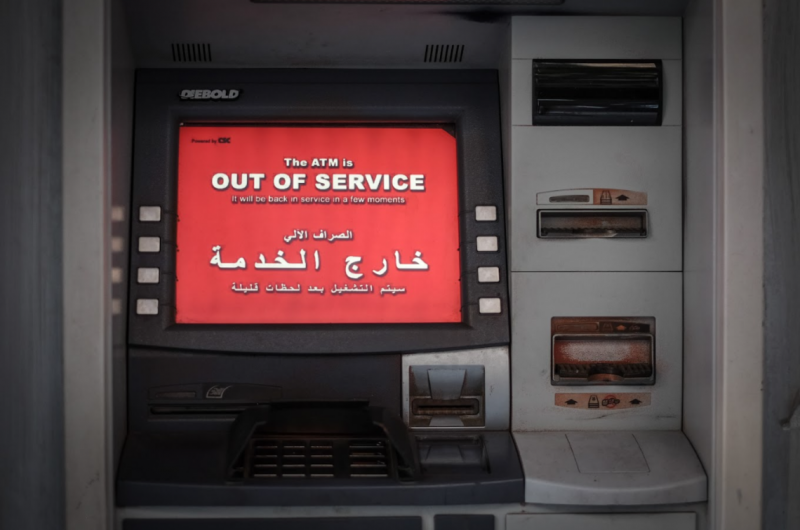
An out-of-service ATM in Beirut. (Credit: João Sousa/L'Orient Today)
BEIRUT — The Banque du Liban (BDL) announced its intention to reintroduce the use of bankcards in the country, in a press release issued on Thursday. The central bank is working in coordination with the Finance Ministry and international payment networks to "reduce the use of cash in the Lebanese market" and bring the country into line with international standards to prevent money laundering and the “financing of terrorism.”
The initiative was announced while BDL's acting governor, Wassim Manssouri, was still in Washington, where the World Bank Group (WB) and the International Monetary Fund (IMF) held their spring meetings.
Encouraging card payments would enable BDL to tighten its grip on the cash in circulation, with the goal of stabilizing the exchange rate between the Lebanese pound and the dollar, which has been stuck at around 89,500 LL since 2023.
In doing so, BDL would be in a position to give more guarantees of good faith — the Financial Action Task Force was considering putting Lebanon back on its grey list last spring.
Cash payments are the primary form of payment in Lebanon since banks crashed in 2019 and began illegally restricting depositors' access to their dollar accounts, without being called to order or even legally covered by the authorities.
The World Bank predicted the cash economy would reach $10 billion by 2023, or roughly half of GDP. By the end of 2022, the country had already lost a quarter of its ATMs and more than a fifth of its bankcards in circulation, pending figures for the whole of 2023.
Lower fees
To boost card payments, the BDL announced that it had asked Visa and Mastercard to reduce fees for local use, "in particular, cards issued outside Lebanon and used on the Lebanese market.”
The central bank did not disclose the extent of the reduction, which Visa and Mastercard appear to have agreed to — if the wording of the press release is to be believed. BDL thanked the two companies for their contribution "to the success" of its initiative.
BDL also asked banks and financial institutions to provide access to card services "at the lowest possible cost" and asked merchants not to impose additional charges for payments by card, a common practice since the start of the crisis.
The central bank also announced that it was working with the Ministry of Finance to establish a system by which taxes can be paid by card. Payment terminals would be installed in each of the ministry's branches.
Promotion of circular no. 165
BDL has indirectly legitimized the restrictions introduced in 2019 by allowing banks to disburse dollars deposited in accounts blocked in Lebanese pounds at a lower rate than the market rate. It also enshrined the distinction between these "bank dollars" blocked by banks and depreciated, and "fresh dollars," a term for money circulating outside the banking sector.
These choices exacerbated inflation even further. The central bank had stopped supporting the market and favored instead a coexistence of exchange rates which completely exploited the functioning of the economy. The dollar in cash quickly became the preferred means of payment, and merchants began to impose substantial fees on card payments.
By 2022, paying in bank dollars by card was essentially no longer an option, while cheques served only as a medium for transactions on an illegal market, bringing together depositors in search of liquidity and others needing to settle liabilities to their banks in bank dollars.
In April 2023, and the last months of the final mandate of former BDL governor Riad Salameh, in office since 1993, the institution adopted a circular (principal no. 165) that directly admits the distinction between bank dollars and fresh dollars, and sets up its own clearing mechanisms. BDL assured that this text, which was met with skepticism from several bankers, guaranteed that cheques "have become an essential, safe, and alternative means of payment to cash.”
BDL also amended its circular no. 69 on electronic payments in 2023, and issued licenses to a number of companies offering digital wallets. Nearly $90 billion in deposits are still being withheld by the banking sector.
In a press statement released Thursday, the Acting Governor indicated that BDL was studying a new breakdown between deposits that will be guaranteed and those whose repayment could be spread over time, or even arranged.